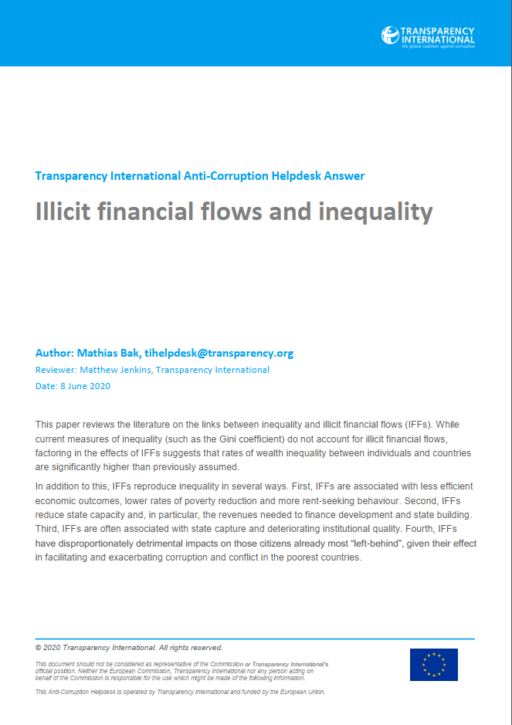
This Anti-Corruption Helpdesk brief was produced in response to a query from one of Transparency International’s national chapters. The Anti-Corruption Helpdesk is operated by Transparency International and funded by the European Union.
Query
Please provide an overview of the literature on links between illicit financial flows and inequality.
Contents
- Caveat
- Background
- IFFs and wealth inequality
- Developmental impacts of IFFs
- IFFs and domestic revenue mobilisation
- IFFs and state capture
- IFFs, fragility and conflict
- Conclusion
- References
Main points
- IFFs are associated with a consolidation of wealth on a global scale, and evidence suggests that IFFs cause greater inequality both within countries and between developing and advanced economies.
- By enabling the well-connected and super rich to avoid taxes, IFFs deprive the state of domestic revenue. This shifts the tax burden towards the middle and lower classes, and hurts the quality of services.
- Better performing and less corrupt institutions are associated with more equal distributions of income and higher levels of economic development. IFFs have a detrimental impact on the quality of institutions and incentivise state capture and corruption.
- In many of the world’s most fragile and conflict-affected settings, IFFs enable the reproduction of negative cycles of corruption and/or violent conflict, which actively undermines the development prospects of many of the poorest citizens.
Summary
This paper reviews the literature on the links between inequality and illicit financial flows (IFFs). While current measures of inequality (such as the Gini coefficient) do not account for illicit financial flows, factoring in the effects of IFFs suggests that rates of wealth inequality between individuals and countries are significantly higher than previously assumed.
In addition to this, IFFs reproduce inequality in several ways. First, IFFs are associated with less efficient economic outcomes, lower rates of poverty reduction and more rent-seeking behaviour. Second, IFFs reduce state capacity and, in particular, the revenues needed to finance development and state building. Third, IFFs are often associated with state capture and deteriorating institutional quality. Fourth, IFFs have disproportionately detrimental impacts on those citizens already most “left-behind”, given their effect in facilitating and exacerbating corruption and conflict in the poorest countries.
Caveat
This literature review focuses on evidence of links between inequality and illicit financial flows (IFFs). It is not a review of financial secrecy practices, the structures or methods that enable legal or illegally acquired capital to be transferred illicitly or initiatives to limit IFFs. The review attempts to build on rather than duplicate previous literature authored by Transparency International, notably the recent Topic Guide on Illicit Financial Flows. In addition, this review examines newer literature and does not make use of studies older than a decade.
The sources used in the review come from a variety of disciplines, such as political science, geography and economics, and from academic journals, think tanks, international organisations and NGOs. In much of the literature, the link between inequality and IFFs is assumed to be self-evident. As a result, not many studies explicitly conceptualise these links or measure their correlation. This review attempts to work around this problem by looking at literature that assesses the broad societal impact of IFFs and then synthesising this evidence in reference to what is known about inequality.
Authors
Mathias Bak, [email protected]
Reviewer
Matthew Jenkins, Transparency International
Date
11/06/2020
Tags
 Download PDF
Download PDF
